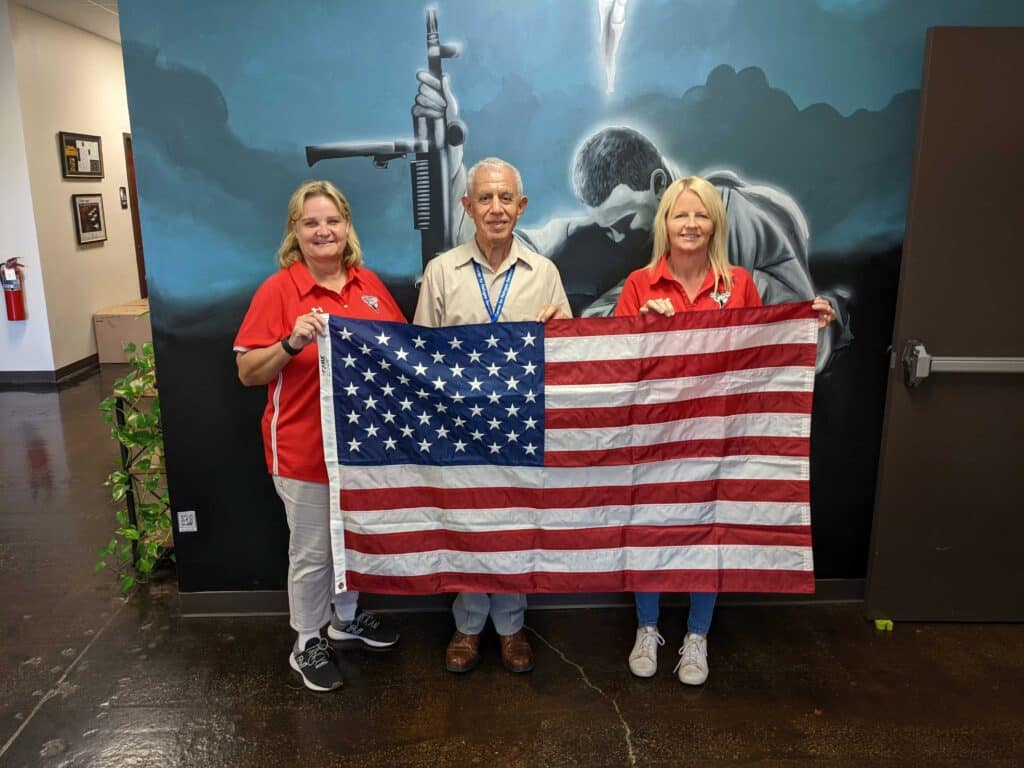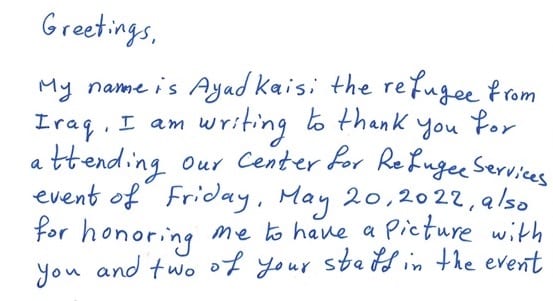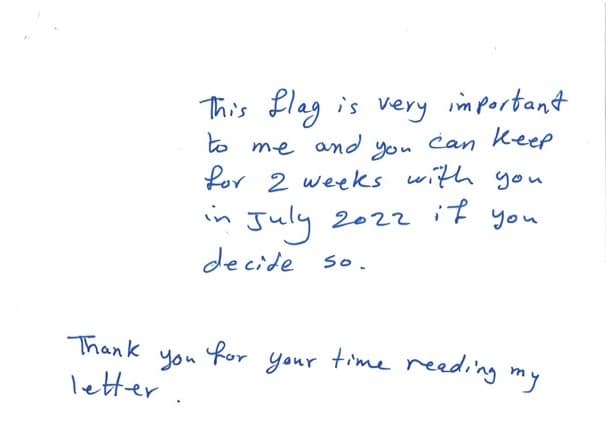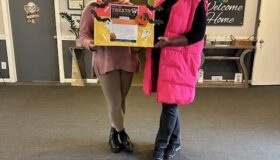Meet Ayad Kaisi: A Refugee turned refugee supporter
August 11, 2022

As you may know, Soldiers’ Angels has been supporting efforts to welcome refugees who fled Afghanistan and are now being integrated into the San Antonio community. Our Special Projects Coordinator, Pat Jopling, got us involved after introducing us to the Center for Refugee Services, an organization she supports through her church. It started with Pat lending her support, and then we joined on to host collection drives for clothes, housing items, and donations. As a veteran who served in Afghanistan, this has been very important to Pat.
“We have refugees, per se ‘evacuees,’ who have been resettled or are resettling here in San Antonio. It’s near-and-dear to my heart because I was in Afghanistan and [I know] their detriment there. When I talk to them it’s kind of like an ice breaker when I tell them I was at Bagram and they smile and say, ‘Oh, you were in Bagram?,’ and I ask them where they’re from and I’m like, ‘Oh I know where that base is,’ so it breaks the ice — it breaks the barrier down a little bit and relaxes them a little bit. So it’s really nice to see a program that has developed so rapidly to try to help them,” says Pat in her A Tribute to Our Heroes interview.
Recently, we were invited to an event at the Center for Refugee Services where we met some of the dedicated volunteers who are passionate about helping refugees. To our surprise, days after the event, we received a letter from Mr. Ayad Kaisi, who was so grateful for the work we do. He made a very unique offer: for the Soldiers’ Angels office to fly the flag that was flown over Saddam’s Palace on July 4, 2006 over Soldiers’ Angels headquarters. What an honor!


While we don’t have the means to do that, we were able to meet Mr. Kaisi and take a photo with the flag and also learn more about his story.
Mr. Kaisi is a volunteer at the Center for Refugee Services and also a member of St. Francis Episcopal Church in San Antonio, where refugees are welcomed. St. Francis offers a Refugee Clinic in partnership with the Center for Refugee Services, a food pantry, and refugee events. Mr. Kaisi is very passionate about serving and supporting refugees as he is a refugee himself. He came to the U.S. 12 years ago from Iraq and received services from the refugee center. He says,
“If there a success in my life in America it’s related to the Cofounder and Executive Director of the Center for Refugee Services, Ms. Margaret Costantino and her support in my journey like she does with all refugees since the center established 12 years ago. She supports the legal refugees coming through United Nations from countries like Iraq, Iran, Afghanistan, Burma, Nepal, Pakistan, South East Asia, and Africa.”
Mr. Kaisi was a translator in Iraq for the U.S. Army but didn’t come through what they call SIV, or Special Immigrant Visa, like most U.S. Army interpreters, he came through United Nations. Before he became a translator, he was a petroleum engineer and later a businessman who sold dialysis machines in Iraq. He had to leave his country because of armed militias and instability after the fall of Saddam Hussein.
“I arrived in the United States on July 12, 2010. My port of entry was Chicago, Illinois and I resettled in San Antonio, Texas. From the first week of my arrival I was received by the Center for Refugee Services. They gave me clothes, basic food, and they put me in classes to learn basic computer skills and to get orientation class of how to learn about my new city, use public transportation, etc. In my first three months of my arrival, the center had an idea to open a refugee clinic to us and I was selected to be the first translator for that clinic to help the refugees,” says Kaisi.
Read more about his transition here.
Now, Kaisi is an “ambassador” for the Center for Refugee Services as a devoted volunteer and board member. He teaches English as a second language, assists refugees in gaining citizenship, and helps however he can. He was recently highlighted on KSAT12 for his work.
So what does all this have to do with an American flag placed on Saddam’s palace; and how did Mr. Kaisi come about having it?
During Operation Iraqi Freedom, Kaisi was the personal interpreter for Lt. Col. Gary Pawlak at the Green Zone in Baghdad, which was part of the joint forces of both the American Army and the new Iraqi army formed following the fall of Baghdad (Joined Forces Operations.)
Kaisi was very crucial as a translator to Lt. Col. Gary Pawlak.
“My story with Mr. Kaisi (Ayad) began in 2006 during my first tour to Iraq. I was assigned to train Iraqi senior staff in their ministry of defense. My areas of responsibility included, training, readiness and force protection security [among other things]. Without Ayads assistance and recommendations, my mission would not have been successful. I can unequivocally make that statement, because Ayad was my third interpreter in a 3 week period. […] Ayad showed up looking like a wall street executive. Clean, properly groomed, and with an attitude of not only wanting to help, but truly wanting me to succeed. We bonded not only as employee and employer but as close friends. In fact, Ayad made it possible for us and the Iraqis to form close personal friendships. Work was hard, I’m not going to minimalize that. The conditions were at times unbearable, due to electricity interruptions, lack of functioning facilities, HEAT! Yet we did it and I hope Ayad understands the great part he had in this success,” explains Pawlak.
In 2006, the U.S. Supreme Court ruled to transfer complete control of Abu Ghraib to the federal government of Iraq. Prior to that, severe human rights injustices took place on Iraqi prisoners, some of whom were interpreters. This was celebrated by the Iraqi people with a special victory party on July 4, which included Lt. Col. Edward Burris, who Kaisi did not know at the time. As part of the celebration, they placed the American flag on Saddam Hussein’s palace in order to, according to Kaisi, “tell the world that Operation Iraqi Freedom was made to do justice.”
“I never met Lt. Col. Burris in Iraq despite being in the same area of war operation but one day after I came to America, a retired pastor named Graig Moyer noticed something in common in my story with a friend of his, Lt. Col. Burris and he introduced us to each other. We both remember the same chow hall where we use to eat and the difficult situation because of Abu Ghraib prison. I recognized that he was one of the officers sent to clean the Abu Ghraib prison after it was closed and we both started to remember a lot of things,” explains Kaisi.
“In 2018, Graig Moyer arranged an event in his house for a small group to come hear the story of mine and the story of Lt. Col. Burris. Lt.Col. surprised us with the flag. He and his wife decided that the most significant honor they ever owned in their house, which is the flag, is best to be handed and to be dedicated to myself for my support and role as an Iraqi interpreter supporting the US Army during the Operation Iraqi Freedom,” says Kaisi.
We asked Lt. Col. Pawlak to comment on the significance of that day. Here’s what he said, “I cannot imagine or even attempt to explain how moving and important that had to be for Ayad. Saddam, as with all tyrants, attempted to dictate all aspects of someone’s life. Freeing people does not mean that they now have the ability to do whatever they please, because that in itself can cause suffering for others. However, if you look at our own constitution, providing the people with the ability to think for themselves and to pursue life, liberty, and happiness THAT! is what, I believe, Ayad saw at that moment. As for refugees, I believe they should be welcomed, especially those like Ayad who risked his life in assisting our mission.”

We are honored to share Ayad Kaisi’s story and honored that he chose to share this very significant American flag with us. We hope that his success in finding a new and meaningful path in America will serve as inspiration for the many Afghan refugees who recently faced the same challenges as Mr. Kaisi.


